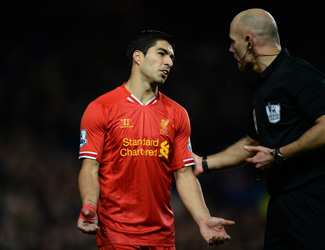I’m a football coach for children between the ages of 6 and 14. Most of them are honest, but some, who are even as young as 6 now dive and feign injury. I recall one serial offender holding his leg in pain and my initial split second reaction was here we go again. But on this occasion the kid was genuinely hurt and he needed a couple of minutes to get back up and play on. It bothered me that my first reaction was unfair to this child, but in my defence he was a constant cheat who always pretended to be injured! So after the coaching session, I told him and the rest of the group the story of the boy who cried wolf and how it relates to diving and injury feigning.
David Ginola was linked into the tale and many of you will remember the time when the Newcastle star was sent off at Highbury in a cracking Cup tie in 1996. This was for two yellow cards offences and the second caution was for a perceived dive. However, TV replays showed that Lee Dixon had actually fouled him and that the sending off was the wrong decision.
Ginola felt hard done by, but it was his reputation that led the referee to believe he was cheating. The same thing happened to our own Robert Pires after the incident against Pompey at Highbury in 2003. As a result Pires ended up on the end of many bad decisions when he was genuinely fouled. If we’re honest then we have to admit that he had to take some blame for that. They say that we don’t mind diving when it’s our own players, but some of us do mind. Opinions on diving have to be across the board and consistent to have any credibility. It’s wrong, it’s against the spirit of the game and there should be no place for it.
I watched Sunday’s Liverpool game on TV and when Luis Suarez went down in the box at 2-1, my first reaction was that the striker was looking for the foul and that Oxlade-Chamberlain hardly touched him. On seeing the replay, it was a clear penalty. What mattered was Howard Webb’s split second reaction and he didn’t have the benefit of the replay.
Suarez should have been given the decision, but he’s simply paying the consequences of his actions. For every genuine foul he is denied, it just makes up for every dishonest one he gained through cheating. As goes the game as goes life, and in life if someone is a proven liar then you have to treat everything they say with suspicion. Sometimes they may be telling the truth, but always in the back of your mind will be the knowledge that this person is capable of being a misleading bulls***ter.
The contradiction in football is that players and managers demand mistake-free refereeing, yet constantly do their best in trying to make referees make the wrong decision. My advice to young players is not to dive. You may fool people a few times at the beginning, but in the end you’ll end up being the one moaning about the lack of justice.
Matthew Bazell is the author of Theatre of Silence: The Lost Soul of Football.







